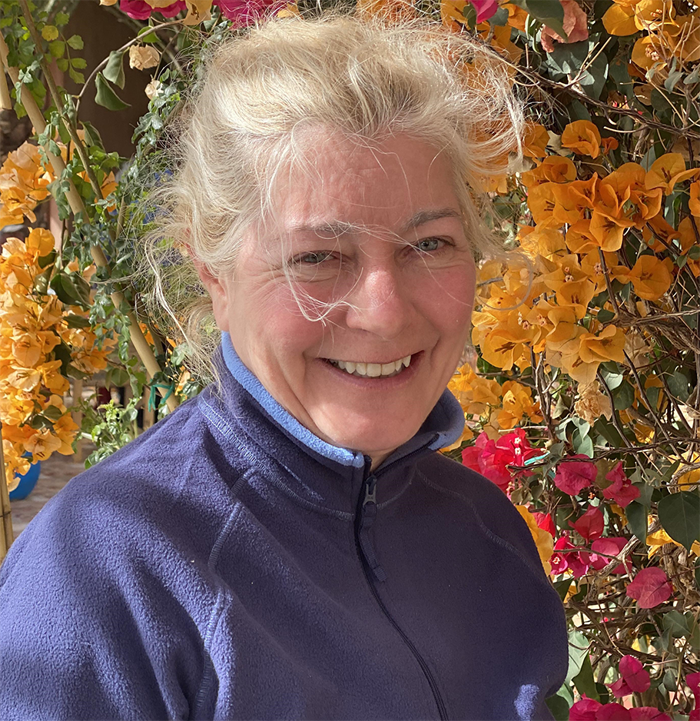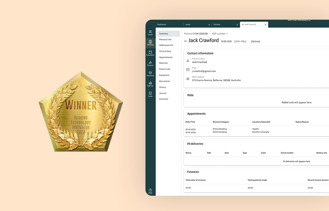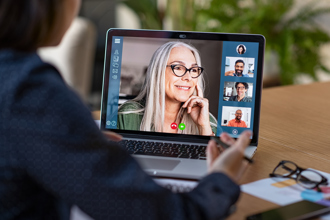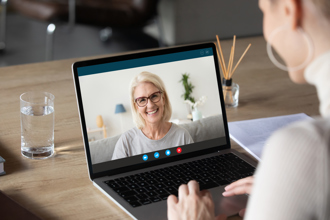Leading with Compassion: An Insightful Interview with Anna Lazenby, Head of Audiology at Bedford Hospital
Anna Lazenby is the Head of Audiology Services at Bedford Hospital, a part of the Bedfordshire Hospitals NHS Trust in the UK.
This Trust encompasses two hospitals within the county, with Anna's service primarily serving the north and mid Bedfordshire areas, covering a population of approximately 300,000.
Anna has dedicated her entire Audiology career of 38 years to Bedford Hospital, with only brief periods away for training and a short spell at Addenbrookes.
This is Anna's story.

1/3
A Touching Patient Story: Breaking Barriers
- Can you share an unforgettable experience with a patient?
I tested a little lad who had just started at school. His family had recently moved from abroad, so they were new to the country. He was very charming, little chap. Testing showed he had a moderate hearing loss, and certainly needed hearing aids. You could probably tell that from his speech and certainly in his awareness, or lack of it. He was a very unswitched-on little guy. His mother questioned my ability to test her child and was clearly unhappy about being there. It was impeding my ability to develop a good rapport with her and make progress in the appointment. I was definitely not feeling warmly disposed towards her.
Just previously to that, I had been on a course in Nottingham with the very wonderful Kris English. It was a counselling course for Audiologists, called Listening with the Third Ear, educating about the counselling skills required by people involved with deaf children and their families. Kris encouraged having frank, open and honest conversations. She mentioned in her talk that people are driven by fear, and then that comes out in their behaviour. You mustn't judge that behaviour, but try to understand it and where it stems from.
I thought, “Right, I'm going to try this advice”, so I said to the mother, “What do you fear most about this situation?”
And she just burst into tears. I then, of course, felt guilty for feeling prickled by her attitude to me, and that I'd been judging her as an awkward and unpleasant human being.
I was blown away by that little tip that Kris English provided. From there the mother and I had a very open conversation, and we were able to identify that her fear was driven by being stigmatised by her family who felt that she had produced a ‘defective’ child. He was viewed badly by the family and she felt guilty about this. But because we got to the root of her issue and had the right conversation, in the end she did accept that help for her child we moved forward.
I was really impacted by this idea from Kris English’s course that changed the entire situation. Initially, we were getting nowhere. Without that simple question, the session would likely have had a very different outcome. She would have left without a hearing aid for her son that day and I'm not sure I would have been able to entice her back. It taught me that seeking to understand her lowered the barrier between us and then we could talk. It was a very powerful moment for me. I wasn't doing my best, I was judging her and I was responding to her attitude to me, rather than the root cause of her attitude.
The Exciting Presence and Future of Paediatric Audiology
- What do you find most exciting about audiology at the moment?
I suppose the most exciting thing at the moment is linked to the saddest thing, which is the issue with paediatric audiology services. Big quality issues have been unearthed and there’s a push to get everyone over the IQIPS hedge with the assumption this will make us safe and fit for purpose. Over the years, many services haven't had the staff they need and have had to adopt a make-do attitude. We haven't been growing sufficient people for senior positions. It’s a hard thing to do if you’re a small service or pressured to prioritise waiting lists. I think, in part, we’ve created this problem ourselves by promoting people into positions without insisting on formalised underpinning knowledge and assessed clinical competency. Paediatric-specific training and qualifications have been around for a long time now. We heard Claire Benton talking at the BAA conference in 2023, saying maybe clinical judgment isn't good enough. If clinical judgment isn't underpinned and validated by examinations and assessments, then maybe it's not good enough. Holding a certain job title isn’t a validation of ability and quality.
There are loads of paediatric audiologists who are hugely experienced and very valuable to the profession, but there must be somewhere in our ranks people who aren’t. The fact that the equivalency route, brought in to examine experienced Paediatric Audiologists, doesn’t have a 100% pass rate shows that some people thought they were doing the right thing but weren’t. Left alone, there’s the danger of settling into practices and a mindset that can persist unchallenged for many years. Out of this sad situation, though, comes something exciting. This is the moment to grasp the nettle, to get ourselves into a stronger position. The BAA has been working hard to create resources like the tool kit. All sorts of things are coming out to support Audiology departments set their house in order, establish a Quality system, and hone their clinical skills. As a small department, accessing these resources is really valuable. I now see the danger in being ‘small’. In larger departments where you’re awash with trainees and scientists, STP students and the like, there are people – sometimes super-numerary – equipped, keen and looking for project work such as writing policies and procedures, auditing, but in smaller services you rarely have these resources to tap into. Sometimes the weigth of important responsibilities sit on the shoulders of just one or two people: the Service lead, the Quality lead, the Governance Lead, the Equipment Lead, the Training lead, and so on. And you can’t have a fraction of a document or quality program just because you’re the fraction of the size of the Audiology service down the road.
Beyond Hearing Tests: The True Scope of Audiology
- What do you think is a common misconception about Audiology?
I think we’re often viewed as “diagnostic”. People think we just test hearing, which of course we do, but the great thing about audiology is that it doesn’t just stop there, we manage our own caseload from referral to outcome. We don't just do a test and then send the patient elsewhere for the results and management plan. We have the privilege of following through. There’s also so much more to Audiology than hearing tests: there’s hearing therapy, balance testing and balance rehab, implant work, for example. We're more holistic and hands on, and an all-age service too. That’s something that I think people don't always realise because we can get lumped in with other diagnostic services.
Journey into Audiology
-
A family friend worked at Bedford Hospital in the mortuary. In those days, it was a paper world, so he would bring home the pages of job ads that were put out by the hospital every week. One week a trainee Audiology job appeared and my parents felt I should apply, which I did. Immediately after the interview – conducted by an ENT surgeon who was the husband of my maths teacher – I was told, “We’d like to give you this job”, and being brought up to be dutiful and respectful, I had to say, “Thank you. That would be lovely.” I started the following Monday, not at the Hospital, but at college as, in those days, we were basically apprentices. Many people think apprenticeships are new and hip, but no, they were there in Audiology all those many years ago! I went to college in Cosway Street in London. For any older readers out there, you may remember Cosway Street. I went there for a day a week – 9am till 8:30pm - and spent the other four days at the Hospital.
-
When I started, our team was really tiny. We worked in a hut in the car park outside A&E, blue lights coming in with their sirens going.
My boss left not long after I qualified. I waited for her to be replaced, but nobody came, so I was unofficially doing a lot of her job. After two years, they formally offered me the Head of Service role. The team was still small, and I didn’t really feel equipped to build our service, so I decided to apply for the MSc. I self-funded, taking a year off to go to Southampton University. It was a good move.
When I came back from completing my Masters, Addenbrookes kindly took me on to do my CAC. It doesn't exist anymore, but it was the clinical training component that followed the Masters. The STP (Scientist Training Programme) encompasses both parts now. So, I went to Cambridge and they put me through the CAC which allowed me to register as a Clinical Scientist. After I finished the CAC at Addenbrookes, they offered me a one year fixed term post covering a colleague’s leave. For that year I did four days at Addenbrookes and came back to Bedford one day a week. Addenbrookes was great, entirely different to Bedford. It was huge, and I enjoyed it very much, but in the end, it wasn’t what I wanted permanently. I felt that I was making a real difference to Bedford, so I returned to working full-time here.
-
If you're thinking to move into Audiology in the NHS, as a career it's never dull. Audiology’s a really diverse field: paediatrics, adult rehab, balance, auditory processing, hearing therapy, implants. There’s something to spark everyone’s enthusiasm.
In my opinion, if you’re being trained by the NHS or tapping into the NHS for the clinical component of your training, then please think about whether you want to join the NHS. If you’re considering doing this to further your career in the private sector, I would urge you to not monopolise the limited training opportunities that exist in the NHS. We are a National Health Service, we're for the nation. And if you want to work for the NHS, take a job. I completely understand there are brief life stages that might necessitate taking a locum position but I don’t see a place for making a career of it. Wouldn’t it be lovely to share all that excessive locum and agency spend to reward the NHS workforce who are loyally signed-up and committed to their responsibilities in their substantive posts.
In the NHS you’re more likely to find yourself in a larger team. Your caseload won’t be limited to straight forward routine hearing loss patients, you’ll be exposed to the whole cross section of auditory and balance issues in the population. You'll work as part of a multi-disciplinary team. There’s Paediatric work; Paediatrics is still not highly present in the private sector. Our scope of practise is broad and I’m sure will broaden further as the Audiologist role expands. You're much more likely to be immersed in a learning environment. The NHS has the facility to take you on, support you through various degree levels, and onwards as you learn and build the career you want, opportunities like the STP, individual M level modules, or higher leadership levels like the HSST. I feel it’s a bit of a life choice, choosing to work for the NHS. It is difficult, it's very full-on and busy but also very rewarding. You can't pretend that there aren’t backlogs and stresses on teams at the moment, but the job has its rewards.
The Power of Technology: Enhancing Patient Care
- You use Auditbase at Bedford Hospital Audiology department. Why do you think it's important to have a good patient management system?
I do like my patient management system. We're nearly coming up a year since we migrated from Practice Navigator to Auditbase. Since moving we’ve had a lot of help, and asked a lot of questions. I’ve always had a keen curiosity about my patient management system.
We're at a point where we’re running our reports again through Auditbase, and I'm very proud of our data. I like access to and visibility of what we report. Then on top of that, obviously it's just groovy, isn't it, having the patient journal, clinical data, and the appointment booking system all in one place. I know various hospitals have moved their bookings onto their hospital systems because their hospitals very much want to have control of the data, whereas I think Auditbase is perfectly capable of producing the information. We get our DM01 report, our RTT reports, all of our performance figures, from Auditbase, and we know the data is clean and accurate. I think it makes for a safe and quality data management system. Functions in Auditbase support our progress towards IQIPS accreditation. You get out of the system what you put in. If you're prepared to work with Auditdata, help is always on hand so I think it's only limited by the mindset of the person who uses it.
Don't Miss Out On the Latest Insights On Audiology
Sign up today to receive exciting updates, tips, and the latest newsletters from Auditdata.






